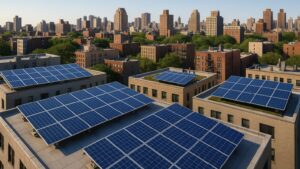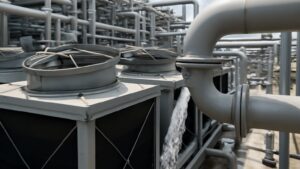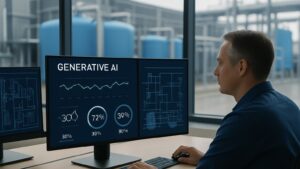The growth of data centers is showing unmatched signs of growth today. It makes the need for sustainable practices and operations that are energy efficient crucial. So, this is where data center standards and certification play a central role in making the industry go on an environment-friendly path. Furthermore, these standards and certifications provide a framework that helps organizations in continuous improvement and recognition of their efforts.
In this article, we will cover some of the data center standards and certifications assessing the criteria for you to follow.
Data Center Standards and Certification: LEED Certification
One of the most well-known data center standards and certification schemes for sustainable data centers is LEED. It came into being from the U.S. Green Building Council (USGBC). A particular version of the standard is called LEED for Data Centres. Furthermore, it is designed to cater to the particular requirements of data center buildings. Data center operators can show their dedication to environmental sustainability with this. They can also enhance their energy, water, and waste management practices by adhering to the LEED criteria.
Data centers are assessed by the LEED certification process using an extensive set of environmentally friendly architectural standards. This covers techniques to increase the energy efficiency of the data center. It includes utilizing high-performance gear and effective cooling systems. It also examines methods for conserving water and giving employees a healthy interior environment. LEED certification is available to data centers that achieve several levels of compliance. It ranges from Certified to Silver, Gold, and Platinum. So, a data center with a higher level shows more sustainable operations.
Sustainable Design Criteria
Data centers are evaluated according to the LEED for Data Centres standard in several important categories. it includes indoor environmental quality, materials and resources, water conservation, and energy efficiency. Moreover, data centers can adhere to green building principles and minimize their environmental effect by using sustainable design methods in these areas.
Certification Levels and Recognition
There are four certification levels offered by LEED, and each has unique criteria and advantages for the environment. Using this tier system, data center operators can aim for higher accreditation levels. They can also aim for a higher sustainability target. Also, when a data center earns LEED accreditation, it shows that it’s serious about sustainability. This matters to both stakeholders inside the company and those outside it.
Integration with Building Management Systems
Integrating with building management systems (BMS) is crucial. It supports the performance of the LEED-certified data center. Furthermore, energy-consuming systems can be optimized, controlled, and monitored in real time thanks to BMS. This supports data center operators in maintaining their sustainability performance. It also helps to continually optimize their operations.
Data Center Standards and Certification: ISO 50001 Energy Management System
The ISO 50001 Energy Management System is a key standard for sustainable data centers that want to be eco-friendly. This international standard offers businesses a thorough framework. This is for creating, implementing, preserving, and improving their energy management programs.
The ISO 50001 standard has several crucial elements. These help data center operators systematically identify and implement energy-saving measures. This involves formulating goals and action plans for energy. It also includes establishing an energy strategy and tracking and assessing energy performance regularly. Furthermore, data centers can drastically lower their energy usage by using ISO 50001. They can cut back on the output of greenhouse gases as well.
Performance Tracking and Reporting
Sophisticated performance monitoring and reporting are necessary for an efficient application of ISO 50001. Data centers need to set up energy performance indicators and gather and evaluate energy data regularly. They also need to report on how they’re doing about energy management objectives. Moreover, accountability and openness are essential for promoting continual development. Additionally, it displays the outcomes of sustainability programs.
Collaboration and Knowledge Sharing
Cooperation and knowledge exchange between operators and industry associations are crucial. It maximizes the effect of ISO 50001 in the data center business. Furthermore, the sector can expedite the adoption of sustainable energy management methods. This is by pooling best practices, lessons, and creative solutions.
Data Center Standards and Certification: BSI Standards
Besides ISO 50001 and LEED, the British Standards Institution (BSI) has created many standards. These guidelines offer a complete plan for making sustainable data centers when you’re designing, building, or running them.
BS EN 50600 Series
Several standards in the series cover the infrastructure and operations of data centers. It covers resource management, environmental effects, and energy efficiency. Data center operators can ensure that their facilities comply with international sustainability criteria. This is by using these standards to assist them in implementing best practices. It can also come in use for evaluating their performance against established benchmarks.
PAS 1192-3:2014
It is a BSI standard that focuses on data and information management in data centers throughout their operational life. Data center operators can make well-informed decisions and consistently reduce their environmental effects with the support of this standard. It helps them optimize sustainability. It also helps the performance of their facilities throughout their lifespan.
Alignment with International Standards
There is a strong alignment between the BSI standards for sustainable data centers and other international frameworks like ISO 50001 and LEED. Data center operators can now adopt a more holistic approach to sustainability. This is by using the advantages of several certification programs to improve environmental performance and recognition.
Industry Collaboration and Adoption
Data center operators, equipment manufacturers, and industry associations must work together and share expertise to guarantee the sector’s wide adoption. The sector can overcome implementation obstacles and promote the adoption of these sustainable frameworks on a large scale.
Conclusion
Environmentally friendly data center standards and certification programs, such as ISO 50001, BSI, and LEED, are essential in steering the sector in the right direction. By following these guidelines, data center operators can minimize their waste, water, and energy management expenses. Additionally, this will benefit the environment and help them reduce their carbon imprint.
If you as an industry professional want to stay informed about all the latest insights and strategies and participate actively in maintaining the efficiency of data centers further, then the Energy Efficiency For Data Centers Summit is for you. It takes place on May 16-17, 2024, in Dallas TX, USA. The events will provide multiple sessions, case studies, and networking opportunities with the industry leaders. So, it will help your organization to move into the sustainability space quickly. Learn more and register right away!





